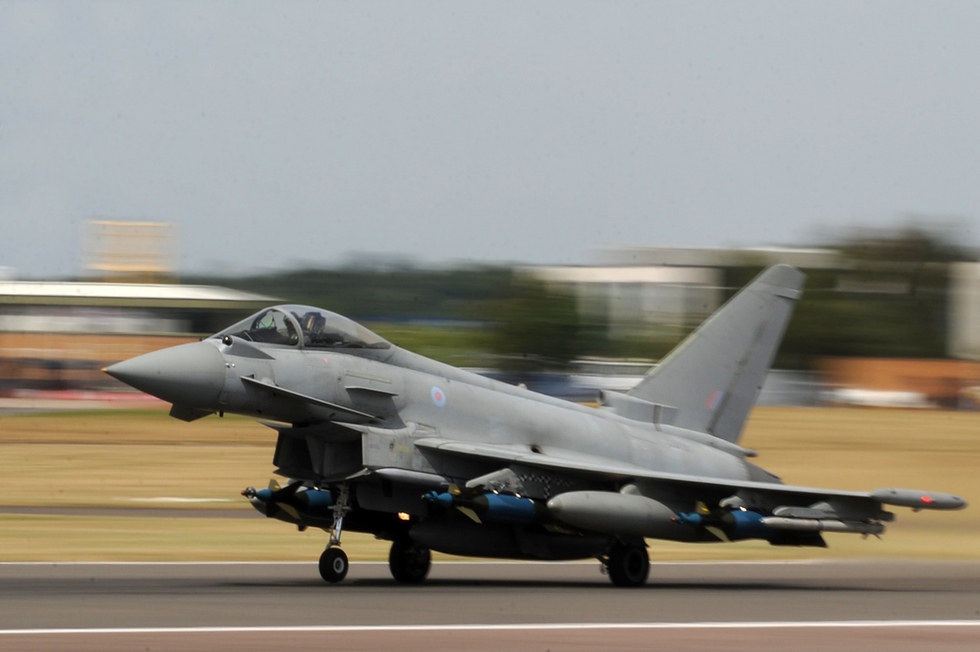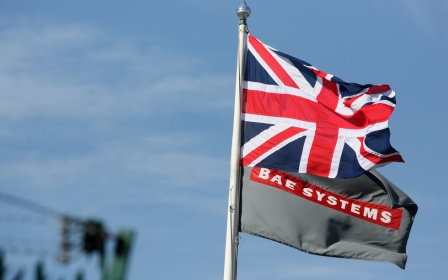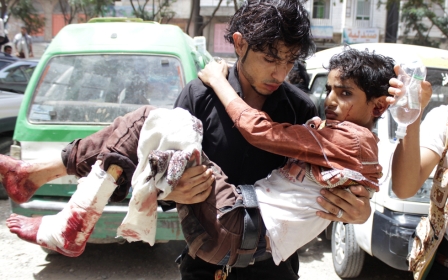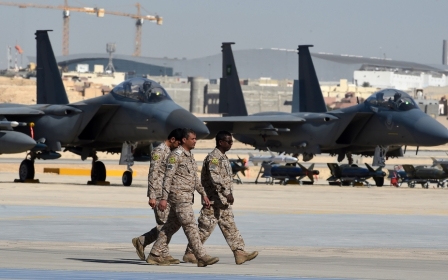BAE refuses to confirm workers loading bombs on Saudi jets

The chairman of arms giant BAE Systems has refused to confirm or deny whether the firm’s staff in Saudi Arabia are loading bombs and missiles onto fighter jets involved in the bombardment of Yemen.
To the dismay of anti-arms trade campaigners, Sir Roger Carr also refused to comment on whether the world’s third largest defence firm had taken steps to prevent British-made Tornado fighter jets - in service with Saudi Arabia’s air force - from being used to drop cluster munitions.
Carr’s comments came during tense and often combative exchanges with peace activists at the firm’s annual general meeting (AGM) in Farnborough in Hampshire, England on Wednesday.
The arms manufacturer, which has 6,200 staff in Saudi Arabia, a key ally to the UK, had hoped to use the AGM to promote a “successful and pivotal year” with rising returns for shareholders.
But the event was infiltrated by a small number of activists affiliated with the Campaign Against the Arms Trade (CAAT) who had purchased shares in BAE to gain access to the AGM and to be able to ask questions.
The AGM itself came as human right groups, including CAAT, await the results of a judicial review brought in February to halt arms exports to the Saudi government until it stops committing abuses of international humanitarian law in Yemen. The decision on that review is due in the coming months.
The AGM, which was carried out amid tight security, saw campaigners repeatedly raising questions over the role played by the firm’s staff in Saudi Arabia and a recent BAE job advert for approximately $40,000 a year for a “weapons load technician” based in Dhahran working with the Saudi Arabian air force.
Dhahran is home to the King Abdulaziz Air Base, where a squadron of Tornado fighter jets is based. Earlier this year the British government confirmed that Tornado and Typhoon jets produced by BAE had been used in strikes in Yemen, where the conflict has claimed the lives of more than 10,000 civilians.
Carr denies 'military action' in Yemen
In a heated exchange, Carr denied the company was involved in “military action,” but repeatedly swatted away questions on whether BAE staff loaded or armed weapons used in strikes in Yemen by Saudi Arabia.
“We are not involved in military action. We do make sure that the equipment we supply under contract performs to specification,” he said.
War is a terrible thing and terrible things happen in war
- Sir Roger Carr, BAE chairman
The firm has repeatedly said that all its sales are in accordance with rules and regulations set out by the UK government, but Carr refused to be drawn on the specific work carried out by the company in Saudi Arabia.
“You must separate one thing from the other, war is a terrible thing and terrible things happen in war,” he added, to scornful laughter from activists.
The jobs advert, which was brandished by activists but has since been removed from the BAE Systems website, listed duties such as loading, arming and de-arming munitions on Tornado aircraft, prompting outrage from rights groups who say this makes BAE Systems complicit in the bombing of Yemen.
When later pressed by questioners on the case of a “double-tap air strike” by Saudi Arabia on a funeral gathering in October 2016 and the possible use of BAE produced aircraft or munitions, Carr said he could not comment and suggested that the questioner be at the site of the strike to describe what happened.
Carr 'extremely evasive'
Campaigners at the event said his answer was “extremely evasive” and “failed to clarify whether it was possible that BAE staff had loaded munitions onto the plane that was used in that air strike”.
When later asked about the capability of BAE-produced Tornado aircraft to deliver banned cluster munitions, he said that the company does not support the use or creation of cluster bombs.
“We do not support cluster munitions. We do not manufacture cluster munitions. That is the end of the story,” he said.
But when pressed further, he said that the firm would “not comment on operations” and refused to confirm or deny whether the firm had approached the Saudi air force about modifying the fighter jets to make the use of cluster munition impossible.
Carr then went on to offer a general defence of the firm’s ethical standing and said that while he was not personally “without a value system,” he made “no apology” for the firm’s actions and stressed that the AGM was “not a court of human rights”.
BAE as a company has been complicit in the destruction of Yemen from day one and profited from it from it every step of the way
- Andrew Smith, CAAT spokesperson
At another point, Carr said his ethical justification was that BAE could be a “force for good in the world”. Alluding to early 20th century US President Theodore Roosevelt, Carr said peaceful nations should “speak softly but carry a big stick” and that BAE “provides the stick”.
Andrew Smith, a spokesperson for CAAT who attended the AGM, told Middle East Eye that Carr’s comments were “extremely concerning”.
“The question of whether BAE staff loaded weapons and whether BAE jets were used to drop cluster bombs are both very important questions that need to be answered beyond doubt,” he said.
“BAE as a company has been complicit in the destruction of Yemen from day one and profited from it from it every step of the way.”
“The argument that you can promote peace from the sale of weapons is an absurd argument which can be used by almost anyone to justify selling weapons to almost anybody. If peace and stability broke out tomorrow, BAE Systems would be among the first companies to go bankrupt.”
BAE's employment in Saudi Arabia
Saudi Arabia is a vital market for BAE System, which employs more than 80,000 staff worldwide and accounts for one percent of UK exports, according to the company. The UK government has approved more than $4.2bn worth of arms since the start of the conflict in 2015, and last month The Times reported that the British government threw its weight behind the company to secure a long-awaited Typhoon jet contract with Saudi Arabia for 48 new aircrafts.
Olly Sprague, Amnesty UK’s programme director for military, security and police, told MEE that BAE is hiding behind the UK’s “warped rules on arms exports”.
“BAE Systems acknowledge they have more than 6,000 people working in Saudi Arabia helping to strengthen the country’s arms capability – so it is outrageous that they continue to hide behind the UK Government’s warped ‘rules’ on arms exports as a justification for their work,” Sprague said.
The AGM was carried out amid strict security which saw campaigner and attendees closely monitored, photographed on arrival and subjected to airport-style security. However, despite a series of questions from BAE staff, peace activists dominated the meeting, which saw Carr scold them for their “prejudice view”.
However, compared to previous years, which saw protests from larger numbers of campaigners, the event was far more stage managed by the arms firm.
“They [BAE] managed to get a lot of planted questions in there and a lot of mutually back scratching and fawning questions from BAE staff,” said Smith.
Towards the end, organisers resorted to switching off the microphones when people whom they identified as activists continued to ask follow up questions and disputed answers provided by Carr.
Earlier, as shareholders arrived at the event - held at Farnborough Airport where the company has offices - BAE Systems staff were on hand to show off high-technology kits, including pilot headsets, advanced displays and a scale model of HMS Queen Elizabeth, the Royal Navy’s new aircraft carrier which has been designed and constructed by the firm. A former Royal Navy weapons officer, now employed by BAE, was even on hand to explain the warships capabilities and brush aside any awkward questions.
Paul Dibbon, 62, a former soldier with the Royal Engineers, was one of private shareholders admiring the model. He told MEE he was “not unsympathetic” to the concerns of activists, but that the firm was vital for the “defence of the realm”.
“This event has been dominated by campaigners in the past, but today isn’t the place to air these concerns. Instead we need a forum for shareholders to raise concerns, look at the business and help set its moral compass. I am favour in defence and defence of the realm, not brutalism,” he said.
New MEE newsletter: Jerusalem Dispatch
Sign up to get the latest insights and analysis on Israel-Palestine, alongside Turkey Unpacked and other MEE newsletters
Middle East Eye delivers independent and unrivalled coverage and analysis of the Middle East, North Africa and beyond. To learn more about republishing this content and the associated fees, please fill out this form. More about MEE can be found here.




